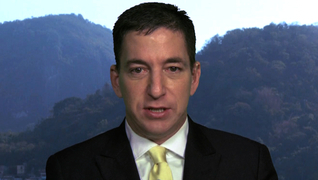
We speak with the ACLU about the FBI’s demand for guest and passenger information in Las Vegas over the New Year’s holiday period using the Patriot Act and subsequent rounds of anti-terrorism legislation passed to give the FBI an expansion of its information-gathering powers without judicial oversight. [includes transcript]
The U.S. was thrown into high alert in December when the Department of Homeland Security upped the nation’s warning level to Code Orange days before Christmas.
Officials across the country have been taking what they call “security measures” in response to the elevated threat level.
Although you may think these measures have not affected you, if you spent this New Year’s in Las Vegas–think again.
The FBI ordered Las Vegas hotels and airlines serving McCarran International Airport to give them information on guests and travelers. The hotel operators and airlines are being required to turn over the information for everyone at least during the New Year’s holiday period.
Newsweek, which broke the story, reported that when one hotel refused to turn over the information, the government subpoenaed the records.
- Gary Peck, executive director of the Nevada chapter of the American Civil Liberties Union.
Transcript
AMY GOODMAN: Gary Peck joins us now, the Executive Director of the Nevada chapter of the American Civil Liberties Union. Welcome to Democracy Now.
GARY PECK: Thank you very much for having me Amy.
AMY GOODMAN: Can you describe what is taking place in Las Vegas?
GARY PECK: In many ways, Las Vegas though not singular is ground zero with respect to all that has gone on after 9-11. Over the New Year’s weekend, we learned that the F.B.I. came in and demanded lists of names, numbering probably around 300,000. Now, the F.B.I. claims that all they were asking for were names, but that’s really an empty statement if you begin to connect the dots. First of all, a number of the hotel casinos that gather and maintain databanks bundle the information on patrons in a way that made it virtually, as a practical matter, impossible to disaggregate data they had. So, when they turned over names, they were also turning over addresses, credit card numbers, telephone numbers, other kinds of personal identifiers to the F.B.I.; but even more important than that, in this last round of Congressional reauthorization of anti-terrorism legislation and monies to pay for it, the F.B.I. sought and got an expansion of its investigative powers. As if the Patriot Act wasn’t bad enough. What the F.B.I. asked for was the ability to demand financial records, not only from financial institutions, but from an array of other kinds of businesses like travel agencies, pawn brokers, and yes, hotels and casinos.
All of this is done without any judicial oversight, without any meaningful checks on that power and that authority, and that’s very troubling, because what that tells us is once they have the names, they are no doubt matching these names up against all sorts of lists they have, and not just lists of terrorists or suspected terrorist, but people who are suspect, the never-do-wells who may be suspected of committing all kinds of crimes or just knowing people who commit crimes. They are matching up their names against those lists, and then for all we know, they have gone back and have asked for comprehensive records on the people they choose to more thoroughly investigate, and guess what, the law also says because the F.B.I. demanded this that there is a — an absolute gag order on these kinds of requests. So, for all we know, thousands of people have been thoroughly investigated. They don’t know it and there’s no way for them to resist those investigations. This is worse than if they went to court, because if they go to court seeking this somebody, people can resist that. They can hire a lawyer, and they can say, you, the F.B.I., have no business digging around in my personal affairs, and you can ask a judge to ask them to stop it. Now, there’s know way to do that.
AMY GOODMAN: Gary Peck, I think it’s — interesting that the U.S.A. Patriot Act provision or expansion was signed by President Bush on December 13. Unusual signing a bill on a Saturday, also to say the least, got obscured by the fact that Saddam Hussein was also caught on that day.
GARY PECK: Well, that’s a political strategy that has become commonplace for this administration. We are non-partisan at the ACLU.
AMY GOODMAN: I have to leave it at that, because the program is over. Thanks for your time, Gary Peck, Executive Director of the Nevada chapter of the American Civil Liberties Union. That does it for today’s program Democracy Now.












Media Options